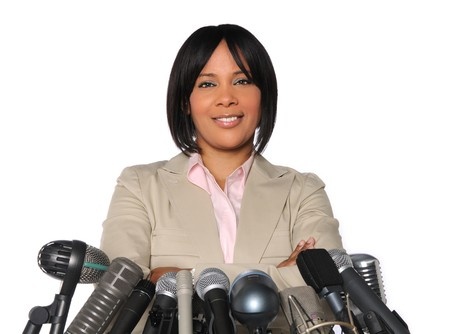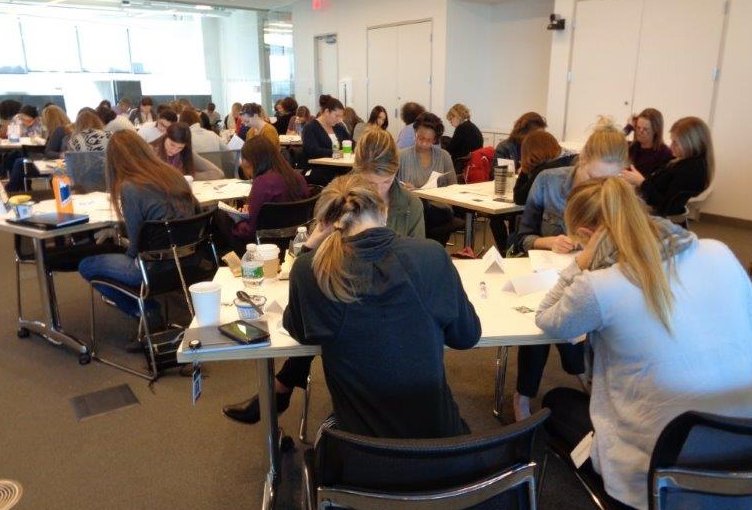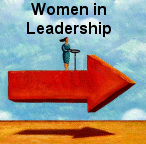Audrey Nelson PhD. is an international trainer, key-note speaker, consultant and author who works with organizations to increase their productivity and profitability through winning communication. strategies.
You can reach Audrey at audrey@audreynelson.com
or at 303.448.1800 O - 303-448-1801 F - 303.448.1802 C www.audreynelson.com |
|
Smart Talk |
50/50 by 2020: A Global Call for Equal Representation of Women
Will Women's Relationship to Ambition Hold Them Back?
Nicola Sturgeon of the Scottish National Party (SNP) is the current First Minister of Scotland; the first female First Minister and the first female to lead any of the devolved UK administrations. Describing herself as a "working class girl from Ayrshire", she added: "I hope that my election as first minister does indeed help to open the gate to greater opportunity for all women. I hope that it sends a strong, positive message to girls and young women, indeed to all women, across our land - there should be no limit to your ambition for what you can achieve. If you are good enough and if you work hard enough, the sky is the limit and no glass ceiling should ever stop you from achieving your dreams." During my recent visit to Edinburgh to conduct A Women's Guide to Leadership, I gained some insight from the Scottish women attending ( a shout out to the women at Scottish Water). I was struck by how ambitious they were matched only by the goal of 50-50 by 2020 set by their First Minister; a call for boards in both public and private sector to have 50% female representation. Now, other countries are considering following the Scottish lead.
But will women's relationship to ambition hold them back. There has been a tradition of women feeling that being ambitious was not very feminine. Men were expected to be ambitious and women not so much.
Time magazine recently conducted a survey on how women really feel about ambition in themselves and in others. The survey found that women were just about as ambitious as men, and that “ambitious” doesn’t necessarily have the same negative connotations as, for example, “bossy” does. Ambition, a complex variable, revealed that having children and generational differences figured into the equation for women.
- Men are slightly more likely to call themselves ambitious than women are, but not by much. 51% of men and 38% of women said they were “very” or “extremely” ambitious– while 23% of women and 16% of men called themselves “not so ambitious,” or denied being ambitious altogether. When asked how what they’d do if given a choice between a comfortable retirement, or the job of their dreams, women were split 50-50 on which they would prefer, but men were closer to 60-40, in favor of the job. (41% of men said they’d pick retirement, while 59% said the job of their dreams.)
- Younger women are significantly more ambitious than older ones. 48% of women in their 20s said they were “very” or “extremely” ambitious, compared to only 26% of women over 60. Younger women are also less likely to say it’s okay to not be ambitious– almost 60% said it was “not so” acceptable or completely unacceptable to be unambitious, compared to 44% of women in their late 40s and 50s.
- Despite their big dreams, millennial women are a lot less confident– 44% of respondents in their 20s cited “fear of failing” or “lack of confidence” as the major things preventing them from being more ambitious, compared to only 22% of women in their late 40s and 50s. Women who were older were much more likely to point to personal priorities as reasons for not being more ambitious.
90% of women in their 20s said they felt “pride” or “empowerment” when publicly recognized for being ambitious (they were allowed to pick several adjectives), compared to only 62% of women in their late 40s and 50s. Twenty-eight percent of women in that age group picked “guilt,” “embarrassment” or “shame” as adjectives that accompanied ambition.
- Women without children were more likely to feel guilty that they weren’t ambitious enough. Forty-two percent of women without children said they thought they had “somewhat” or “much” too little ambition, compared to 33% of mothers. They were also less tolerant of lack of ambition– 51% said
- Women who were well into their careers were more likely to think of ambition as an unappealing quality, although, overall, the term seemed to be widely embraced by men and women of all ages. 90% of women in their 20s said they felt “pride” or “empowerment” when publicly recognized for being ambitious (they were allowed to pick several adjectives), compared to only 62% of women in their late 40s and 50s. Twenty-eight percent of women in that age group picked “guilt,” “embarrassment” or “shame” as adjectives that accompanied ambition.
- Women without children were more likely to feel guilty that they weren’t ambitious enough. Forty-two percent of women without children said they thought they had “somewhat” or “much” too little ambition, compared to 33% of mothers. They were also less tolerant of lack of ambition– 51% said it wasn’t acceptable to not be ambitious, compared to 48% of moms.
|
Did
you miss one of the
Smart Talk Columns? |

| Browse
the archives of Audrey’s
2006 to date- Smart Talk Columns on her web!
Simply visit www.audreynelson.com and click on “Newsletters. |
|
|
|

|

Have you checked out Audrey’s blog?
Front and Center: An Important Domain for Women
Click for article |
| Audrey's Travels |
 A Women's Guide to Leadership: Power, Communication and Credibility A Women's Guide to Leadership: Power, Communication and Credibility
January 13, 2016 Wednesday
Boulder Women's Leadership Group
Boulder Chamber -
2440 Pearl Street
Boulder, CO 80302
(303) 442-1044 -
Information/Registration: info@boulderchamber.com
|
| Audrey's Travels |
 |
 |
| Audrey presented A Women's Guide to Leadership in Boston to New Balance. New Balance Athletic Shoe, Inc. (NBAS), best known as simply New Balance, is an American footwear manufacturer based in Boston. The company was founded in 1906 as the "New Balance Arch Support Company" and is one of the world's major sports footwear manufacturers. The company has reached a total profit of approximately $40 billion since 1991. |
|
 Don't Qualify it! Just Say it! Don't Qualify it! Just Say it!
A technique employed by women more than men is the use of qualifiers.
Just say it; don 't qualify it! Another technique employed by women more than men is the use of qualifiers. Here are some common qualifiers used by women:
-Well, no.
-I was thinking, we could leave at 2 P.M.
-It's time to go, I guess.
-It seems to me that is a good idea.
-I wonder if we should pursue that contract.
Employing qualifiers is a way that women counterbalance being direct. Again, this linguistic strategy could be argued to serve as a technique allowing for input and consideration of other ideas. However, if the woman feels definite and does not want to appear tentative on an issue, she should eliminate the qualifier. Let me introduce you to my disclaimer: the ultimate mitigation.: ..watch |
| Audrey's Programs |
 Audrey has a new program, A Women's Guide to Leadership: Power, Communication and Credibility. A Woman's Guide to Leadership is a hands-on seminar with how-to-steps for every business women who wants to conquer the communication nuances that can enhance her credibility, and make a greater impact on the job. Credibility and power are attribution variables, they are aperception-in the eyes of the beholder. Women come to the workplace with a set of complex communication behaviors that create an undeniable challenge; women are often seen but not heard. The strategies presented go beyond common sense and will provide women with cutting-edge verbal and nonverbal techniques that can be applied directly with immediate success. Audrey has a new program, A Women's Guide to Leadership: Power, Communication and Credibility. A Woman's Guide to Leadership is a hands-on seminar with how-to-steps for every business women who wants to conquer the communication nuances that can enhance her credibility, and make a greater impact on the job. Credibility and power are attribution variables, they are aperception-in the eyes of the beholder. Women come to the workplace with a set of complex communication behaviors that create an undeniable challenge; women are often seen but not heard. The strategies presented go beyond common sense and will provide women with cutting-edge verbal and nonverbal techniques that can be applied directly with immediate success. |
|
|
Audrey,
Just a quick note to say thank you for two great programs in KC and St. Louis. It sounds like the participant feedback was terrific and I really appreciate all you put into making both classes an excellent experience for them
Best,
Brendan Dowd
Director – IMS Kansas City and St. Louis
Audrey,
First, I wanted to thank you for leading the seminar on Friday! It reinforced a number of key communications values that I have and try my best to practice, but it also pointed out to me that my perception of ‘empathy’ was not truly in line with what we discussed, which was a good thing!
Thank you…
David Burbridge : Director – Project Management, Ameren Transmission
Ameren Services
Hi Audrey,
It was so great to meet you and work with you on the Women in Leadership seminar. I hope you had an easy flight back west. We had a fantastic time with you and overall the group really enjoyed your session.
Below is the compiled feedback from the day. Please let me know if you have questions.
ANDREA ST. PIERRE
LEARNING & DEVELOPMENT
NEW BALANCE ATHLETICS, INC.
100 GUEST STREET
BOSTON, MA 02135-2088
The Women's Guide to Leadership: Power, Communication and Credibility
OVERALL RESULTS |
1 |
2 |
3 |
4 |
5 |
6 |
7 |
8 |
9 |
10 |
Average |
Relevance and value of today's material to my current role |
|
|
|
|
1 |
1 |
2 |
8 |
6 |
33 |
9.27 |
Instructor's knowledge of material |
|
|
|
|
|
|
|
|
2 |
49 |
9.96 |
Instructor's ability to convey information and facilitate discussion |
|
|
|
|
|
|
|
3 |
5 |
43 |
9.78 |
Effectiveness of the exercises and activities |
|
|
|
1 |
2 |
|
5 |
3 |
7 |
33 |
9.14 |
Overall quality of the seminar |
|
|
|
|
|
1 |
3 |
3 |
7 |
37 |
9.49 |
Recommendation to others |
|
|
|
|
1 |
|
2 |
3 |
4 |
40 |
9.58 |
|
|







 A Women's Guide to Leadership: Power, Communication and Credibility
A Women's Guide to Leadership: Power, Communication and Credibility




